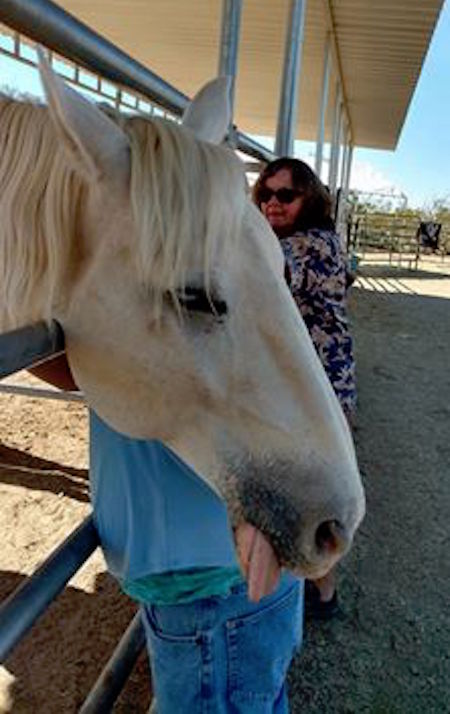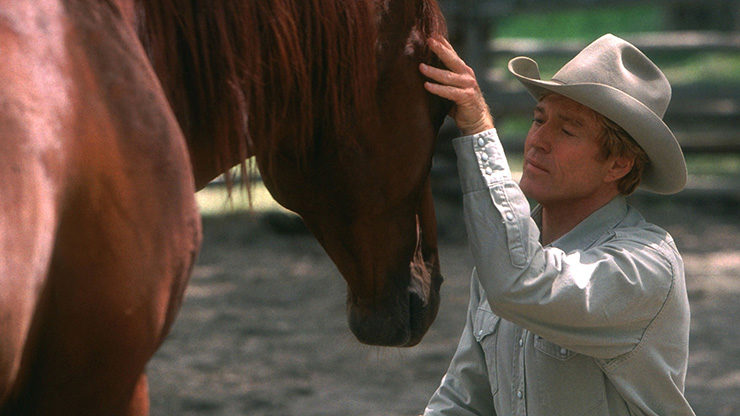A couple of posts ago, one of our dedicated commenters happened to apprise us of a discussion over at the Vorkosigan reread. There, host Ellen MCM opined,
I would be very surprised if my unicorn was telepathic. And if it could read minds, I think it would be unlikely to act on the information in a way that humans would consider useful.
I think it begs the question: if one did have a telepathic equine, how would it react to hearing our thoughts? Or how would a human telepath perceive an equine mind?
Well now. To answer these questions, we’re going to have to suspend some modern Western disbelief, and enter into the fantasy novel that is many horse people’s daily existence.
Horses are extremely sensitive to body language. They pick up signals that are far too subtle for human senses, and communicate on levels that may not be telepathy as such, but by our standards, might as well be.
They’re also herd animals, designed to function within an extended family unit, both socially and defensively. Every horse is an individual, but that individual cannot, except in rare cases, be separated completely from its membership in the herd.
Their spatial awareness is remarkable. They’re conscious of everything around them to a degree that humans can’t match. They pick up emotions, too, positive as well as negative, and react to what to us would seem to be barely perceptible expressions of fear and anger as well as happiness and contentment.
But is that all it is? Just a heightened combination of physical senses? Is there more?
Here’s where we get into “Aw, come on” territory, as far as modern Western culture goes. But horses don’t really care what we think, except insofar as it affects their life, liberty, and pursuit of the best grazing.
Let’s go into the zone, then, and talk about telepathy. Merriam-Webster keeps it simple: communication from one mind to another by extrasensory means. The Cambridge English Dictionary opens it up a little bit: communication with another person by thinking rather than by using words or other signals. In short: speaking mind to mind.
Since the equine vocal apparatus isn’t designed for human speech, mental communication makes a certain degree of sense. But is there such a thing? And if there is, would a horse and a human be able to have a mutually comprehensible conversation? Can or will a horse have anything in common, mentally or emotionally, with a human?
The original commenter was talking about her particular take on unicorns. A unicorn does not need to be a horse, or a terrestrial animal of any kind. The original was probably either a goat or a rhinoceros. Plus, a writer gets to decide how the writer’s fictional world works.
But as long as we’re talking about horses, who are terrestrial animals, we’re in SFF Equine territory, and that’s where the horsekids and their friends live. Humans have connected with horses in various ways since long before written history. That connection requires at least some mutual ability to comprehend each other’s wants and needs. That’s what horse training is—and as any dedicated animal person knows, training goes in both directions. The horse will train you even as you train her.
Much of that of course is body language, touch, and the human voice: horses have excellent ability to understand and respond to voice commands, though they can’t answer back in the same language. However, many horse people will assure you that it goes deeper than that. When a horse and a human work together, their brain waves come into sync.
Horses are extremely sensitive to energy, from the straightforward physical shock of static electricity to the much more subtle effects of emotions such as fear and anger—and calm and contentment as well. Trainers talk about “the two minds,” how to suppress human tension and frustration and present an air of calm and confidence around horses. Horses will mirror the mental state of their handlers, and not just because they can smell your fear or feel your stiffness. They love Reiki, which is straight-out off-the-grid energy work. Here’s what it does to them.

He’s so relaxed he can’t even hold up his tongue. The eyes were blinking, the head sinking lower and lower, the ears becoming ever more horizontal. Just because the lady in blue held her palm half an inch from his neck.
When I grew up around horses, I was a pretty normal Western skeptic. Ride as well as I could, stay calm even if I was afraid, make sure I was in charge because human had to be boss. Then I bought my own farm, and the horses I bred and raised began to show me how superficial my understanding of everything was, from how to feed and clean up after them to what they were really about as individuals. Being primarily and often solely responsible for them meant interacting with them on levels I hadn’t even known existed.
Even then, with all my reading and research and my study of equine biology and physiology, plus all the riding and training, I still hadn’t quite got it. I knew that acupuncture worked with them—really, really worked—and that chiropractic was sometimes essential for keeping them sound and fit. I knew how to stay safe in the herd, how to ride and train without getting splatted, how to read their body language and their emotional states from day to day.
Then I took the horse pictured above to another farm for a riding clinic. He was a happy traveler, point him at a trailer and he’d hop on and go wherever. Very confident, loved to show off. Could take him anywhere.
So we were getting ready for our session, had him saddled, were taking him from his stall to the arena. This involved walking through a narrow access gate, no big deal, just walk through—and I started having a panic attack.
I’m not prone to them, and in that case there was no reason for it. We were just talking through a gate. But my heart was racing, my head was dizzy, I was just not feeling right.
Then my trainer said, “It’s not you.”
It was the horse. He’s a claustrophobe. Our gates at home are wide enough not to trigger him, and he doesn’t mind trailers because they’re also wide, and he doesn’t mind the dividers. But that little two-foot gap between two pipes was OHHHH NO NO NO.
And that was my first conscious experience of a horse’s emotions as completely separate from my own. Once I realized what was happening, I was able with the trainer’s help to calm him down and ease him through, but I had a lot of processing to do. I mean, come on. He was in my head.
Turns out he always had been, but I passed it off as “love my pretty white pony, he loves me back,” and yes, we are all little girls at heart when it comes to horses.
So was it telepathy? There weren’t any words. Animal communicators will tell you there generally aren’t. They’re emotions, impressions, images. The communicator’s job is to translate those into words for the human.
Then again.
Claustrophobia boy’s sister is a completely different personality. Nowhere near as confident. Not neurotypical: her sensitivity levels are extreme. She has a lot of trouble with overstimulation. In the herd she can be explosive, and she gets into fights if somebody looks at her wrong.
I was musing once about breeding her, and kind of jokingly asked, “Would you like to make a baby?”
I heard a voice in my head, clear and definite. “NO.”
Ooookay.
So is any of this useful in human terms? Does the horse’s response benefit us?
I’d say it does. Presuming we accept that they’re communicating mentally as well as physically, we can also accept that they’re telling us how they feel, and picking up our feelings as well. That includes “useful” information such as horse is hungry or thirsty, horse is scared, horse is happy, horse has bellyache or is itchy or wants help stretching a muscle.
Does it go the other way as well? I think so. Horses can be very calming, for example, when the human is stressed or emotionally messed up. You’ll be all in knots, and find yourself leaning against the big warm shoulder, breathing along with the horse, and feeling orders of magnitude better.
The hard part is determining where physical signals leave off and actual telepathy starts. Human body awareness is so much less acute than that of a horse, and humans add to it by getting all up in their heads and not paying attention to subtle physical signals that to a horse are coming through loud and clear. Nevertheless, there are moments, such as that panic attack or that word in my head, when I’m willing to concede that we’ve crossed the threshold.
Top image from The Horse Whisperer (1998)
Judith Tarr is a lifelong horse person. She supports her habit by writing works of fantasy and science fiction as well as historical novels, many of which have been published as ebooks by Book View Cafe. She’s even written a primer for writers who want to write about horses: Writing Horses: The Fine Art of Getting It Right. Her most recent short novel, Dragons in the Earth, features a herd of magical horses, and her space opera, Forgotten Suns, features both terrestrial horses and an alien horselike species (and space whales!). She lives near Tucson, Arizona with a herd of Lipizzans, a clowder of cats, and a blue-eyed dog.










